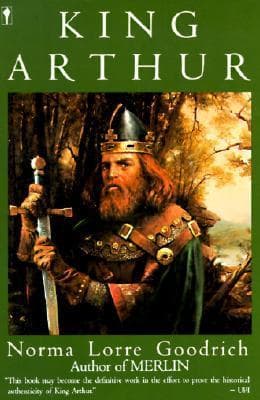
Book Review Summary: King Arthur
Introduction
"King Arthur" by Norma Lorre Goodrich is a captivating book that delves into the historical authenticity of the legendary King Arthur. Goodrich, a prolific author and Arthurian scholar, presents a compelling argument that challenges traditional views of Arthur's origins. This book has garnered praise from readers who appreciate its in-depth analysis and unconventional theories. In this article, we will explore the author's background, analyze common opinions among readers, and summarize the reasons for both recommending and not recommending this book.
About Norma Lorre Goodrich
Norma Lorre Goodrich, the author of "King Arthur," was a renowned Arthurian scholar known for her unconventional theory that King Arthur was Scottish, not English or Welsh. She held a Ph.D. in comparative literature and was a professor of writing at the University of Southern California and the Claremont Colleges. Goodrich's extensive research and language-based approach to historical analysis set her apart as a prominent figure in the field of Arthurian studies.
Analysis of Views
- Enthralling Journey: Many readers found "King Arthur" to be a fascinating book that started their quest for the Holy Grail. The book's comprehensive study and meticulous research impressed readers, who appreciated the author's ability to assimilate information and translate languages. The book's length, at around 400 pages, may have been daunting, but readers felt it was worth the investment.
- Intense Study: Readers described "King Arthur" as an intense and comprehensive study that aimed to prove the existence of King Arthur. Goodrich's language-based approach to historical research made the book stand out from traditional historical texts. While some readers found it challenging, they appreciated the depth of knowledge and the numerous revelations presented throughout the book.
- Intriguing and Well-Researched: Readers found "King Arthur" to be intriguing and well-researched, with Goodrich presenting plausible theories that challenged conventional beliefs about Arthur's origins. However, some readers noted that Goodrich's insinuations and lack of concrete evidence made it difficult to fully embrace her conclusions.
- Mixed Reactions: A few readers expressed mixed feelings about "King Arthur." While some appreciated Goodrich's extensive research and unconventional theories, others criticized her for ignoring or despising certain texts that did not support her ideas. Some readers felt that Goodrich's biases influenced her conclusions, leading to a lack of objectivity in her analysis.
- Historical Perspective: Readers appreciated "King Arthur" for its ability to place the myth of Camelot in a historical perspective. The book provided valuable insights into the historical context of Arthurian legends and helped readers understand the evolution of these stories over time.
Reasons for Recommendation
- In-Depth Analysis: Readers recommended "King Arthur" for its in-depth analysis of the historical authenticity of King Arthur. The book's comprehensive study and meticulous research provided readers with a wealth of knowledge about the legendary king and his kingdom.
- Unconventional Theories: The book's unconventional theories about King Arthur's origins intrigued readers, who appreciated Goodrich's willingness to explore alternative perspectives and break through established beliefs.
- Engaging Writing Style: Many readers praised Goodrich's writing style, which made complex historical information accessible and engaging. Her ability to present complex ideas in a clear and concise manner made the book enjoyable to read.
Reasons for Not Recommendation
- Lack of Objectivity: Some readers felt that Goodrich's biases influenced her conclusions, leading to a lack of objectivity in her analysis. They believed that she discounted ideas that didn't support her theory and accepted only those elements that fit her narrative.
- Poorly Constructed Sentences: A few readers criticized the book for containing poorly constructed sentences, bad etymology, and erratic reasoning. They felt that Goodrich's theories were based on a selective reading of Geoffrey of Monmouth's texts and ignored or dismissed other sources that contradicted her ideas.
Conclusion
"King Arthur" by Norma Lorre Goodrich is a captivating book that delves into the historical authenticity of the legendary King Arthur. Readers appreciate its in-depth analysis, unconventional theories, and engaging writing style. However, some readers express mixed feelings about Goodrich's biases and lack of objectivity in her research. Overall, "King Arthur" offers a fascinating exploration of the enduring legend of Camelot and provides valuable insights into the historical context of Arthurian legends.